GRE Exam
The Graduate Record Examination (GRE) serves as a pivotal standardized test, primarily utilized for admissions into graduate programs, particularly in the United States and other English-speaking nations. Developed by the Educational Testing Service (ETS), the GRE’s primary function is to assess readiness for the rigors of postgraduate study across various disciplines such as business, education, engineering, humanities, and sciences. This exam tests not just the breadth of your knowledge but also your ability to think critically and analytically, essential skills for succeeding in advanced academic environments.
Furthermore, the GRE stands out due to its adaptability, supporting applications to a wide array of academic fields. It acts as a versatile tool that complements your academic records and recommendations, offering a comprehensive view of your capabilities to admissions committees. As you prepare to tackle the challenges of graduate school, the GRE acts as a critical indicator of your potential to excel in complex scholarly pursuits. It not only helps institutions evaluate your suitability for their programs but also assures you of your preparedness to embark on this next educational frontier, whether it’s in pursuit of an MBA, an exploration of the humanities, or a dive into scientific research.

Why take GRE Test?
Taking the GRE (Graduate Record Examination) can offer several benefits for individuals considering advanced studies at the graduate level. Here are some reasons why one might choose to take the GRE:
- Graduate School Admission: Many graduate programs, especially in the United States and other English-speaking countries, require GRE scores as part of the admission process. It serves as a standardized measure to evaluate the academic readiness of applicants across various disciplines.
- Broad Applicability: The GRE is widely accepted across different fields, including business, education, engineering, humanities, and sciences. This versatility makes it a common choice for individuals interested in a variety of graduate programs.
- Global Recognition: The GRE is recognized by universities and institutions around the world, making it valuable for individuals considering international graduate studies.
- Common Metric for Comparison: As a standardized test, the GRE provides a common metric for comparing candidates from diverse educational backgrounds. It helps admissions committees assess applicants on a level playing field.
- Scholarship Opportunities: Some institutions and scholarship programs use GRE scores as part of their criteria for awarding scholarships and financial aid. A strong GRE performance can enhance your chances of receiving financial support.
- Career Advancement: For individuals already in the workforce, pursuing advanced studies through graduate programs can open up new career opportunities and contribute to professional growth. Some employers may also consider GRE scores when evaluating candidates for certain positions.
- Flexibility: The GRE offers flexibility in terms of test format. Test-takers can choose to take the computer-based GRE at an authorized test center or opt for the GRE at Home option, allowing them to take the test remotely.
- Score Validity: GRE scores are typically valid for five years, providing flexibility for individuals to decide when to apply to graduate programs.
What is GRE Score Validity?
GRE scores are valid for a period of five years from the test date. This validity period allows you to use your scores for graduate school applications several years after taking the test. For instance, if you took the GRE in October 2023, your scores would remain valid until October 2028. This timeframe is beneficial for those who may need to delay their graduate studies or wish to reapply to different programs over several years. It’s essential to check with the specific institutions and programs to which you are applying, as some might have their own requirements regarding the recency of GRE scores.
GRE 2024: Overview
| Exam Name | GRE |
| GRE exam full form | Graduate Record Examinations |
| Official Website | https://www.ets.org/gre |
| Most popular for | MS courses in the USA |
| Conducted by | ETS (Educational Testing Service) |
| Mode of Exam | Computer-delivered test Paper-delivered test GRE at Home |
| GRE Fee | US $220 |
| Score Range | Verbal Reasoning score range: 130–170 Quantitative Reasoning score range: 130–170 Analytical Writing score range: 0–6 |
GRE General Test & Subject Test?
Fully SEO Optimized Article including FAQ’s
The GRE General Test and the GRE Subject Tests are designed for different purposes and serve distinct roles in the graduate school admissions process. Understanding their differences is crucial for prospective graduate students deciding which exams to take based on their academic and career goals.
GRE General Test:
- Purpose and Scope: The GRE General Test assesses general academic readiness for graduate-level work across a wide range of disciplines. It measures skills that are considered essential for success in a variety of graduate programs, including business and law.
- Content Areas: It covers three main areas: Analytical Writing, Verbal Reasoning, and Quantitative Reasoning. The Analytical Writing section tests critical thinking and analytical writing skills. Verbal Reasoning assesses reading comprehension and vocabulary, while Quantitative Reasoning evaluates basic mathematical skills and the ability to reason quantitatively.
- Format: The General Test is mostly computer-based, although a paper-based version is available in areas where computer testing isn’t accessible. The computer-based format allows for an adaptive testing approach in the Verbal and Quantitative sections, where the difficulty of questions adjusts based on the test taker’s responses.
- Utility: Scores from the GRE General Test are used by admissions committees across all types of graduate programs to compare applicants’ qualifications and preparedness for graduate-level academic work.
GRE Subject Tests:
- Purpose and Scope: In contrast, GRE Subject Tests measure knowledge in a specific field of study, such as Chemistry, Mathematics, Physics, or Psychology. These tests are intended for students who have an undergraduate major or extensive background in one of these areas.
- Content Areas: Each Subject Test is focused solely on content related to its respective field, offering a detailed assessment of a candidate’s expertise and knowledge depth in that subject.
- Format: Subject Tests are paper-based and administered three times a year. They consist of multiple-choice questions that cover a broad range of topics within the specific discipline.
- Utility: These scores are particularly important for applicants to specialized programs within their field of study, as they help demonstrate the applicant’s proficiency and in-depth knowledge relevant to their intended area of graduate study.
Comparison Summary:
- The GRE General Test is more about evaluating general academic abilities that apply to a wide range of disciplines, whereas GRE Subject Tests focus on specific knowledge in a particular academic field.
- The General Test is adaptive and mostly computer-based, making it more flexible in terms of scheduling and taking the exam. On the other hand, the Subject Tests are strictly paper-based and only offered on fixed dates.
- Scores from the General Test are universally applicable to most graduate programs, while Subject Test scores are crucial for those applying to highly specialized areas that require a deep understanding of a specific subject.
GRE Exam Eligibility 2024
The Graduate Record Examination (GRE) is a standardized test commonly required for admission to graduate programs in various fields. Eligibility for the GRE is quite flexible, as the test is open to individuals worldwide who are planning to pursue a master’s degree, MBA, or doctoral degree.
Here are some key points regarding GRE exam eligibility:
- Educational Background: There are no specific educational requirements to be eligible for the GRE. However, since the GRE is primarily used for admission to graduate programs, you should be a bachelor’s degree holder or in the final year of your undergraduate program.
- Age Limit: There is no age limit for taking the GRE. Individuals of any age can take the test.
- Number of Attempts: There is no limit to the number of times you can take the GRE. However, there are specific rules about how often you can take it.
- Identification: When registering for the GRE, you’ll need to provide valid identification. This could include a passport, national ID card, or other acceptable forms of identification.
- Purpose: Most individuals take the GRE for admission to graduate or business school. However, some people may take it for fellowship purposes or to fulfill other graduate-level application requirements.
GRE Eligibility: Age Limitation
There is no set maximum age for applicants who want to take the GRE.
GRE Eligibility: Exam Qualification
ETS has not released any official statements regarding the qualifications necessary to take the GRE Exam. Candidates must, however, hold a graduate degree in any field from an accredited institution.
GRE Exam Fees 2024
GRE Exam Fees in India: Students from India who wish to take the GRE General Test must pay a $213 application fee. The GRE exam fee is approximately Rs. 15,912 in Indian rupees ($1 = Rs 74.70). Students in India would pay about Rs. 11,205 ($1 = Rs 74.70) for the $150 GRE Subject Test, which is available worldwide. Additionally, there is an additional fee for applicants who wish to switch test locations or reschedule their appointments.
Global GRE Application Fee and Related Fees through 2024
How much does it cost to take the GRE? This will be covered in this section. Here is an international GRE price breakdown:
| Location | GRE Fee |
| GRE Fees in Australia | $230.00 |
| GRE Fees in China | $231.30 |
| GRE Fees in India | $213.00 |
| GRE Fees in Nigeria | $226.00 |
| GRE Fees in Turkey | $255.00 |
| GRE General Test Fees in other areas of the world | $205.00 |
| GRE Subject Test Fees in the world (all locations) | $150.00 |
GRE Cancellation Fee/ GRE Rescheduling Fee
The GRE fee would be lost if candidates had to cancel or reschedule their registration for the GRE General Test less than four days before the test date. For a $50 fee, candidates could reschedule their GRE. In addition, candidates must pay $50 to switch a subject on the GRE Subject Test.
GRE Special Handling Requests
Candidates would need to pay an additional fee if they wanted to use those services. The fees for handling special service requests are listed below.
| GRE Services | GRE Fee |
| GRE Late Registration Fee | $25 |
| GRE Standby Testing Fee | $25 |
| GRE Changing the test center Fee | $50 |
| GRE Rescheduling fee | $50 |
| GRE Subject Change Fee | $50 |
GRE Slot Booking
GRE registration is done through the ETS GRE slot booking process. In this section, we will explain to GRE candidates how to successfully reserve a spot for the test. Three precise steps make up the GRE slot booking process:
1-GRE Registration
2-GRE Exam Dates
3-GRE Test Centers
GRE Registration 2024
Registration for the GRE test can be done in a variety of ways. Both online and over the phone are common ways for aspirants to sign up for the GRE exam. Candidates may also register by fax or mail addition to this. Candidates must have a valid passport or Aadhar Card during registration to book a slot for the GRE test. Debit or credit cards are also required to pay the US$213 registration fee.
Ways to Register for GRE Test
- GRE Online Registration
- GRE Phone Registration
- GRE Mail Registration
- GRE Fax Registration
How to apply for GRE online?
To register for the GRE using the online method, candidates must follow the instructions below.
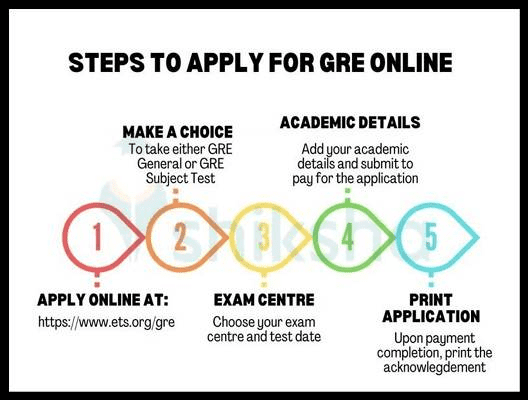
-Applicants must register for an ETS account on the official website: https://www.ets.org/mygre
-Select the GRE General or GRE Subject Test that they want to take.
-Choose whether they want to take the GRE at home or at a designated GRE Test Center.
-Select the date on which they want to take the GRE Exam, then look for the closest testing facility. If they plan to take the GRE at home, omit this step.
-The specifics of their education.
-Go ahead and pay the $213 registration fee.
Understanding the GRE Components
The Graduate Record Examination (GRE) is structured into three distinct sections, each designed to test different skills essential for graduate-level academic success. Here’s a breakdown of the GRE’s paper pattern:
- Analytical Writing: This section evaluates your ability to articulate complex ideas clearly and effectively, construct and evaluate arguments, and support ideas with relevant examples and reasoning. It serves as a critical measure of your preparedness to undertake rigorous writing at the graduate level, assessing not just the clarity of your expression but also your critical thinking skills.
- Verbal Reasoning: Here, your comprehension and reasoning skills are tested. The section measures your ability to analyze and draw conclusions from discourse, understand multiple levels of meaning, such as literal, figurative, and author’s intent, and summarize text. It also tests your ability to understand the meanings of words, sentences, and entire texts, and to make distinctions among different interpretations.
- Quantitative Reasoning: This section assesses your basic mathematical skills and your ability to analyze data and draw conclusions using reasoning skills. The content includes arithmetic, algebra, geometry, and data analysis, which are all foundational for many graduate programs, especially in the sciences, engineering, and business.
GRE Exam Pattern for the GRE Computer-based Exam vs. GRE Paper-based Exam
The detailed GRE Exam Pattern for both the GRE Computer-Based Test and the GRE Paper-Based Test is provided below for candidates planning to take the GRE General Test.
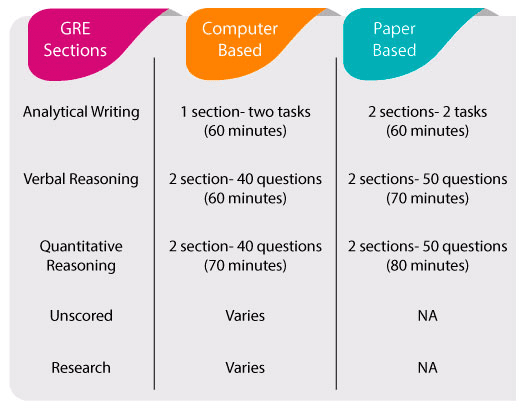
GRE Syllabus 2024
GRE Exam Syllabus: The GRE General Test and GRE Subject Test each have a unique syllabus. The standard exam that gauges a student’s verbal reasoning, quantitative reasoning, and analytical writing abilities is the GRE General Test syllabus. Students who are interested in pursuing specialized subjects should take the Subject Test, which may be required by the college or university to which they are applying. The Subject Test aims to evaluate a candidate’s technical expertise in particular fields.
GRE Exam Syllabus
Analytical Writing Syllabus requires you to
-Articulate difficult concepts lucidly and successfully
-Ideas with pertinent justifications and examples
-Examine the assertions and supporting details
-Maintain a focused, logical conversation
-Command the components of standardized written English
Verbal Reasoning Syllabus requires you to
Review the discourse and make inferences; logically infer from incomplete data and specify the viewpoint or assumptions of the author; know the author’s intention as well as various levels of meaning, such as literal, figurative, and other levels.
Choosing crucial information, separating it from unimportant or minor information. Summarize a text; comprehend a text’s structure
Comprehend the meaning of words, sentences, and texts as a whole; comprehend the connections between concepts and words.
Quantitative Reasoning Syllabus requires you to
-Comprehend, interpret, and evaluate quantitative data
-Utilize mathematical models to solve issues
-Apply fundamental knowledge of mathematics, algebra, geometry, and data analysis.
GRE Score 2024
Test results: Candidates who have taken the GRE can access their test results by logging into their GRE account with their login information. The GRE has a 340 overall score. Similarly, the minimum GRE score is 260, and the maximum GRE score is 340. The verbal and quantitative portions of the GRE are added together to create the composite score, while the AWA portion’s score is shown separately.

When are the GRE total scores available?
10 to 15 days following your test date, your official GRE test results will be accessible in your account on the GRE website. Within three weeks of the test date, they will be delivered to the universities of your choice. When the results are available, ETS will send you an email to let you know that your official GRE results are now available in your account. Candidates will also have 10-15 days after the GRE test date to access their GRE at Home scores.
Candidates should be aware that they will have access to their GRE raw scores for the Verbal Reasoning and Quantitative Reasoning sections immediately following the conclusion of the test. The analytical writing section, which employs a human scoring functionality, will be accessible during the official GRE score report. The candidate’s performance on the GRE would be reflected in their raw scores. The official scores and the raw scores are nearly identical. If they are unhappy with the performance, candidates do have the option of canceling their score. There won’t be any official scores that are recorded and sent to universities in this situation.
How to Send GRE Score Report?
The fact that you can send your GRE scores to up to four colleges or scholarship programs is important for your GRE fee. You will be required to choose the score receivers at the test center if you are taking the computer-delivered GRE. If you opted for the paper-delivered GRE format, you would be prompted to choose your score-receiving colleges on your admission ticket or during registration.
You will be prompted to select the people you want to share your GRE results with after finishing the test and viewing your unofficial Verbal Reasoning and Quantitative Reasoning scores on the test day. Ask the test center administrator for a list of colleges that aren’t on the list if the college of your choice isn’t there. After the test, you can order additional score reports for each college for $27.
What is the GRE Score Range?
To better understand how your GRE score will be determined, you must have some understanding of the scoring pattern. According to the official website, the GRE Score Report includes the following elements along with their respective GRE score range.
| Section | GRE Score Range | Mean* |
| Verbal Reasoning | 130–170 | 150 |
| Quantitative Reasoning | 130–170 | 152 |
| Analytical Writing | 0–6 | 3.6 |
| Total | 260–340 | – |
GRE vs. GMAT
Candidates frequently have questions about the GRE and GMAT tests. The comparison between the GMAT and GRE exams is shown in the table below (GMAT vs. GRE).
| GRE | Parameters | GMAT |
| The GRE (Graduate Record Examination) test is required for most graduate schools and also a significant number of business schools. | Why take the test | The GMAT (Graduate Management Admission Test) is widely used for admission to most business schools. |
| The GRE test comprises a 60-minute Analytical Writing section and two 30-minute Verbal Reasoning sections. There are two 35-minute Quantitative Reasoning sections and a 30–35-minute experimental section that can be either math or verbal. | Test format | The GMAT test pattern is made up of GMAT consists of a 30-minute Analytical Writing section with one essay, a 30-minute Integrated Reasoning section, a 62-minute Quantitative section, and a 65-minute Verbal section. |
| The total duration of the GRE test is three hours and 45 minutes. | Duration of the test | The total duration of the GMAT test is three hours and seven minutes. |
| The GRE Exam fee is US$213 | Cost of the exam | The GMAT Exam fee is US$275. |
| The GRE is valid for five years. | Validity of exam | The GMAT is valid for five years. |
Frequently Asked Questions: GRE Exam
Candidates who have taken the GRE should be aware that their score is valid for five years starting from the test day.
The Analytical Writing, Verbal Reasoning, and Quantitative Reasoning portions of the GRE test make up the majority of the test, and students have a total of 3 hours and 45 minutes to complete the exam. There isn’t a single GRE cut-off, but each college and course that accepts GRE scores will have a list of requirements on the official website. Candidates must lean toward the higher margin to be admitted to the best graduate schools.
With the GRE ScoreSelect option, recently introduced by ETS, students can choose which of all their GRE test results are best to send to the designated institutions. This increases his chances of admission since only his top scores are presented to the university. On the official website, more information about the same is available.
Good GRE Score: Keep in mind that colleges do not have minimum “cutoff” marks required for admission if you are applying for MS programs in the US specifically. You must still be aware of the typical GRE scores at the best US universities. The good GRE score range listed below will put you ahead of the competition (50 percent or more), but it won’t be as helpful when applying to highly competitive programs.
GRE Verbal Section: 152 – 158
GRE Quantitative Section: 153 -158
GRE Analytical Writing: 4.0
The admission requirements of your preferred university or program significantly impact your average GRE score. To get a sense of their typical GRE score, candidates can look at the table below.
GRE Verbal Section: 149.97
GRE Quantitative Section: 153 -158
GRE Analytical Writing: 4.0
Candidates frequently fail to obtain the desired scores. They must retake the GRE exam in order to perform better. Candidates can learn everything about the GRE preparation advice provided below to comprehend clever strategies to improve their GRE scores.
Candidates who are unsure of how their GRE scores will appear when they are released can review the example GRE Score Card below.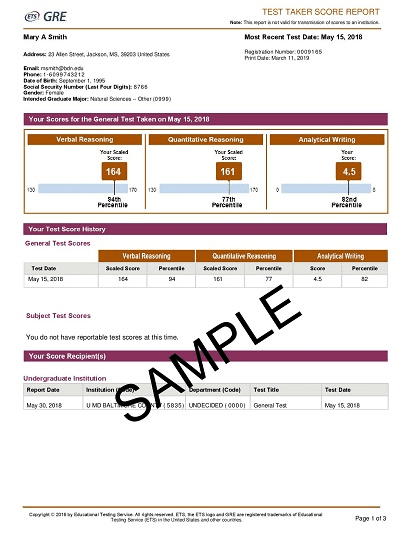
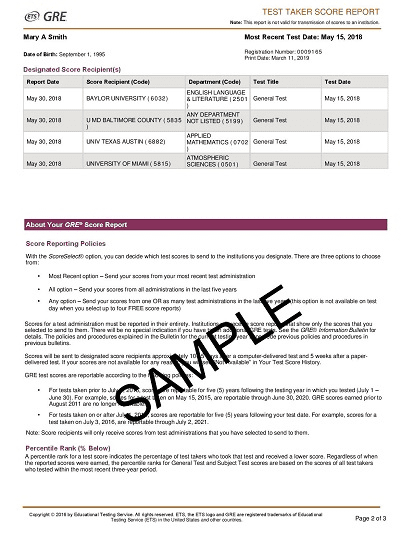
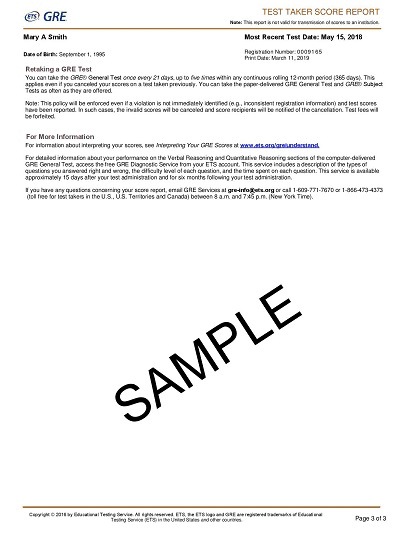
The GRE General Test is offered all year long at GRE test locations, and candidates who are unable to visit the location can choose to take the test online. The GRE exam slots are given out on a first-come, first-served basis, so applicants should be aware of this.
According to experts, applicants who plan to apply to graduate programs abroad should take the GRE 2–3 months before the school’s initial deadline. This would give them the option to retake the GRE test if necessary.
The GRE score requirements should be considered an important factor but not the final deciding factor in the student application process. Good GRE scores will definitely increase your chances of admission as they are a crucial component of the study abroad admissions process.
This would entirely depend on the student’s individual capacity for learning. However, it is advised that students set aside two to three months for intensive GRE preparation or three to four months if they intend to spread out their test preparation schedule.
Your preferred GRE test prep resource should be ETS, the organization that administers the GRE. Numerous general GRE test preparation resources, including online practice tests and a free math review guide, are available on the official GRE exam website for free and purchase.
Focusing on your weak areas where you have lost points and developing strategies to avoid making the same mistakes you did on a prior test will help you improve your GRE scores.
Your GRE General Test is section-level adaptive or computer-adaptive, which means that the difficulty level of the questions in the second section of the GRE test is determined by the test-performance taker’s in the first section.
The GRE test should be chosen by students who want to enroll in graduate, business, or law schools. Thousands of schools all over the world accept it. On the official website, you can find a list of MBA programs from around the world that accept the GRE General Test. In addition, you can view the full list of organizations and fellowship programs on the official ETS website.
Candidates frequently ask about the best time to apply for the GRE exam, making it one of the most frequently asked questions. Candidates should be aware of two things: first, the deadline for university applications, and second, their GRE test preparation schedule. Candidates should wait until they are thoroughly prepared before applying for the exam and should also apply early, so they have plenty of time to complete their application forms. The ideal time to register for the GRE exam is two months before the first application form deadline.
Many universities are eliminating the GRE exam for the benefit of the students in light of the current circumstances. We advise students to visit the official university website to learn about and follow the admissions requirements.
Candidates must go to the GRE above the official website and register by setting up a test-taker profile. The candidate only needs to choose a preferred test location and date after creating a profile before continuing with registration. Candidates can also sign up for the GRE at Home test, which allows them to take the exam from home if their computer meets the requirements.
ETS, the organization in charge of administering the GRE exam, has not established any prerequisites for applicants. Students who need GRE scores to apply to universities can take the test.
While many universities have discontinued the GRE exam due to the pandemic, we still advise our students to visit the institution’s official website to learn the most recent status of the situation and make plans accordingly.
Indian nationals would have to pay US $213 to take the GRE exam. As was mentioned in the aforementioned article, there is an additional fee for special requests like late registrations and rescheduling.
Candidates may take the GRE General Test up to five times in a single continuous rolling 12-month period or once every 21 days.
In order to secure their preferred location and test date, aspirants are advised to register for the GRE exam as soon as possible. Applicants can sign up online or over the phone for their GRE exam. The GRE exam can also be signed up informally by mail or fax, among other methods.
The primary distinction between GRE and GMAT is that, while GMAT is accepted by colleges worldwide that offer business courses, GRE is more commonly accepted by universities that offer master’s programs. Students who want to enroll in graduate school therefore choose the GRE, while those who want to attend business school choose the GMAT. Both exams have a verbal and a numerical section. In the verbal section of the GRE, candidates’ vocabulary is evaluated, whereas, in the GMAT, grammar is given more weight. Furthermore, there are many similarities between the GMAT and GRE quantitative sections.








Leave a Reply
Want to join the discussion?Feel free to contribute!